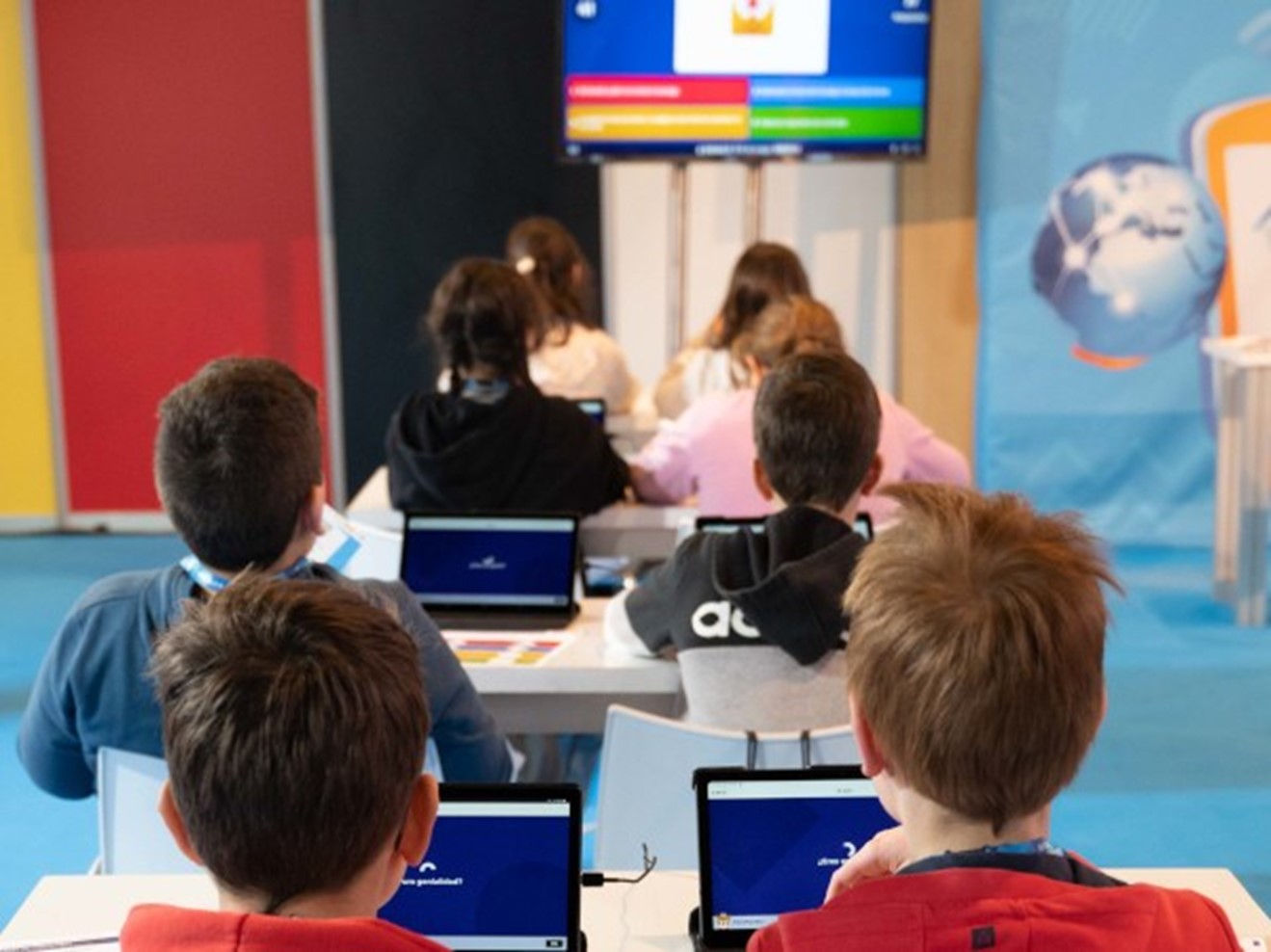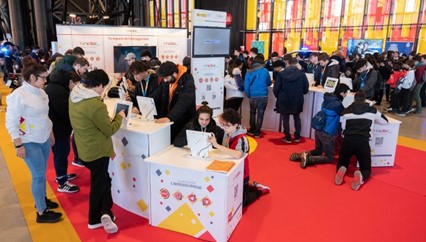The practical workshops and school routes were attended by more than 4,050 classrooms in educational centres. Read on to find out more about Safer Internet Day (SID) celebrations in Spain.

The Spanish National Cybersecurity Institute (INCIBE), a body linked to the Ministry of Economic Affairs and Digital Transformation, through the Secretary of State for Digitalisation and Artificial Intelligence, is in charge of the Spanish Safer Internet Centre Internet Segura for Kids (IS4K). This edition of Safer Internet Day saw a record participation, with more than 84,000 attendees from various educational centres, families and the senior population, compared to 32,000 from last year.
This year, under the slogan 'Together for a better internet', SID celebrated its 20th anniversary by encouraging children, young people and their families and friends to use digital technologies safely and positively, promoting their skills in this area and motivating them to be respectful, critical and creative, in line with European digital principles.
Thus, INCIBE has organised numerous activities, such as practical workshops and school routes that have been attended by more than 4,050 classrooms in educational centres and more than 82,000 students.
The interactive online workshops have been organised in collaboration with the National Institute for Educational Technologies and Teacher Training (INTEF), attached to the Ministry of Education and Vocational Training, with the aim of helping students to develop their digital skills in order to learn how to use the internet safely and responsibly.

The objective, therefore, was to demonstrate and facilitate teachers' incorporation of online safety and security didactical content in their classroom planning, contextualising this content in relation to their experience and use, as well as the level of understanding of each group of students, trying to make it meaningful and encourage them to continue studying these subjects in depth, thanks to resources such as didactic units, educational games or activities to be applied in the classroom.
On 7 February, the awards ceremony was also held for the "What is 017 for you?" competition, in which more than 200 classrooms from different educational centres took part. The aim of the competition was to inform Spanish schools and their students about “your aid in cybersecurity", the national, free and confidential helpline that INCIBE offers internet and technology users, including children and their families and educators, to help them solve any digital problem or concern that may arise in their day-to-day lives.
Workshops and games
Schools also participated in school routes that included practical cybersecurity workshops for students aged 10 or older, where they worked on verifying links and domains and learnt the main privacy and security settings on devices and digital accounts, among other things. The itinerary also included a theatre play about cybersecurity, which depicted a fast-paced scenario of video game scams, with different endings for the players. They could also enjoy a cybersecurity gymkhana, testing their skills in games and educational activities, such as the "encryption wheel", "the internet ladder: zero tolerance for cyberbullying", "comments go" on sending positive messages on social networks, or the interactive educational games "getting around the web" or "word roulette".

In addition, a programme of activities open to general public were organised to promote the safe and positive use of technology, in a fun and family-friendly way, with different games to test the skills of young and old, a cybersecurity theatre play, the CyberScouts booth and an information point where parents have received guidelines and resources for parental mediation.
Other activities
Furthermore, INCIBE and the University of León signed a collaboration agreement on the 7th to promote the culture of cybersecurity through CyberCamp-Unileón. This initiative facilitates the organisation of different events and activities in Spain, within the framework the Recovery, Transformation and Resilience Plan, financed by the European Union (Next Generation). Six face-to-face workshops were held for senior citizens with the aim of increasing their computer skills and teaching them how to protect themselves when browsing the internet.
Finally, INCIBE organised technical conferences to promote talent in cybersecurity and an individual CTF (Capture The Flag) with different categories of point-based challenges, in which more than 20 people tested their knowledge of cryptography, reverse engineering and web exploitation, among other things.

From now on, until the next Safer Internet Day on 6 February 2024, we intend to continue accompanying children, teenagers, families and schools in acquiring digital skills for the safe and responsible use of the internet. Together, we can make the internet a better place.
Find out more about Safer Internet Day in Spain. Alternatively, find more information about the work of the Spanish Safer Internet Centre, including their awareness raising, helpline, hotline and youth participation services – or find similar information for other Safer Internet Centres throughout Europe.
The practical workshops and school routes were attended by more than 4,050 classrooms in educational centres. Read on to find out more about Safer Internet Day (SID) celebrations in Spain.

The Spanish National Cybersecurity Institute (INCIBE), a body linked to the Ministry of Economic Affairs and Digital Transformation, through the Secretary of State for Digitalisation and Artificial Intelligence, is in charge of the Spanish Safer Internet Centre Internet Segura for Kids (IS4K). This edition of Safer Internet Day saw a record participation, with more than 84,000 attendees from various educational centres, families and the senior population, compared to 32,000 from last year.
This year, under the slogan 'Together for a better internet', SID celebrated its 20th anniversary by encouraging children, young people and their families and friends to use digital technologies safely and positively, promoting their skills in this area and motivating them to be respectful, critical and creative, in line with European digital principles.
Thus, INCIBE has organised numerous activities, such as practical workshops and school routes that have been attended by more than 4,050 classrooms in educational centres and more than 82,000 students.
The interactive online workshops have been organised in collaboration with the National Institute for Educational Technologies and Teacher Training (INTEF), attached to the Ministry of Education and Vocational Training, with the aim of helping students to develop their digital skills in order to learn how to use the internet safely and responsibly.

The objective, therefore, was to demonstrate and facilitate teachers' incorporation of online safety and security didactical content in their classroom planning, contextualising this content in relation to their experience and use, as well as the level of understanding of each group of students, trying to make it meaningful and encourage them to continue studying these subjects in depth, thanks to resources such as didactic units, educational games or activities to be applied in the classroom.
On 7 February, the awards ceremony was also held for the "What is 017 for you?" competition, in which more than 200 classrooms from different educational centres took part. The aim of the competition was to inform Spanish schools and their students about “your aid in cybersecurity", the national, free and confidential helpline that INCIBE offers internet and technology users, including children and their families and educators, to help them solve any digital problem or concern that may arise in their day-to-day lives.
Workshops and games
Schools also participated in school routes that included practical cybersecurity workshops for students aged 10 or older, where they worked on verifying links and domains and learnt the main privacy and security settings on devices and digital accounts, among other things. The itinerary also included a theatre play about cybersecurity, which depicted a fast-paced scenario of video game scams, with different endings for the players. They could also enjoy a cybersecurity gymkhana, testing their skills in games and educational activities, such as the "encryption wheel", "the internet ladder: zero tolerance for cyberbullying", "comments go" on sending positive messages on social networks, or the interactive educational games "getting around the web" or "word roulette".

In addition, a programme of activities open to general public were organised to promote the safe and positive use of technology, in a fun and family-friendly way, with different games to test the skills of young and old, a cybersecurity theatre play, the CyberScouts booth and an information point where parents have received guidelines and resources for parental mediation.
Other activities
Furthermore, INCIBE and the University of León signed a collaboration agreement on the 7th to promote the culture of cybersecurity through CyberCamp-Unileón. This initiative facilitates the organisation of different events and activities in Spain, within the framework the Recovery, Transformation and Resilience Plan, financed by the European Union (Next Generation). Six face-to-face workshops were held for senior citizens with the aim of increasing their computer skills and teaching them how to protect themselves when browsing the internet.
Finally, INCIBE organised technical conferences to promote talent in cybersecurity and an individual CTF (Capture The Flag) with different categories of point-based challenges, in which more than 20 people tested their knowledge of cryptography, reverse engineering and web exploitation, among other things.

From now on, until the next Safer Internet Day on 6 February 2024, we intend to continue accompanying children, teenagers, families and schools in acquiring digital skills for the safe and responsible use of the internet. Together, we can make the internet a better place.
Find out more about Safer Internet Day in Spain. Alternatively, find more information about the work of the Spanish Safer Internet Centre, including their awareness raising, helpline, hotline and youth participation services – or find similar information for other Safer Internet Centres throughout Europe.
- < Previous article
- Next article >












